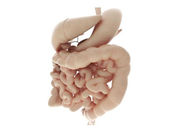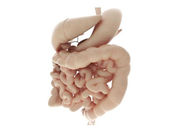Tag: Cancer: Colon
Citywide Colon Cancer Control Coalition Ups Screening in NYC
Efforts of coalition increased screening colonoscopy from 42 percent in 2003 to almost 70 percent in 2014
Dose-Response Pattern for Smoking, Colorectal Neoplasm
Increase in non-advanced, advanced CRN with increasing smoking; no link for alcohol intake
Low BMI Linked to Increased Risk of Progression, Death in mCRC
Risk of progression and/or death highest for low BMI, decreases as BMI increases, then plateaus
Continuing Mailed FOBT Program Ups CRC Screening Adherence
Continuing benefits for patients who completed FOBT tests in years one and/or two of the program
WHO: Evidence That Processed Meat Can Cause Cancer
Meanwhile, red meat only shows some association with an increased risk for colorectal cancer
SNORA42 Identified as Novel Oncogene in Colorectal Cancer
Increased SNORA42 expression is independent prognostic factor for overall, disease-free survival
Extended RAS Testing Urged Before EGFR MoAB Therapy
Extended testing recommended for mutations in KRAS, NRAS in patients with metastatic CRC
Most Cancer Patients Believe Surgery Will Be Curative
Findings even among patients with stage IV lung, colorectal cancer
USPSTF Recommends CRC Screening for 50- to 75-Year-Olds
Grade A recommendation for 50- to 75-year-olds; individualized decision urged for those age 76 to 85
More Evidence Daily Aspirin May Protect Against GI Cancer
Four-year study found survival doubled for GI cancer patients who took low-dose pill each day














